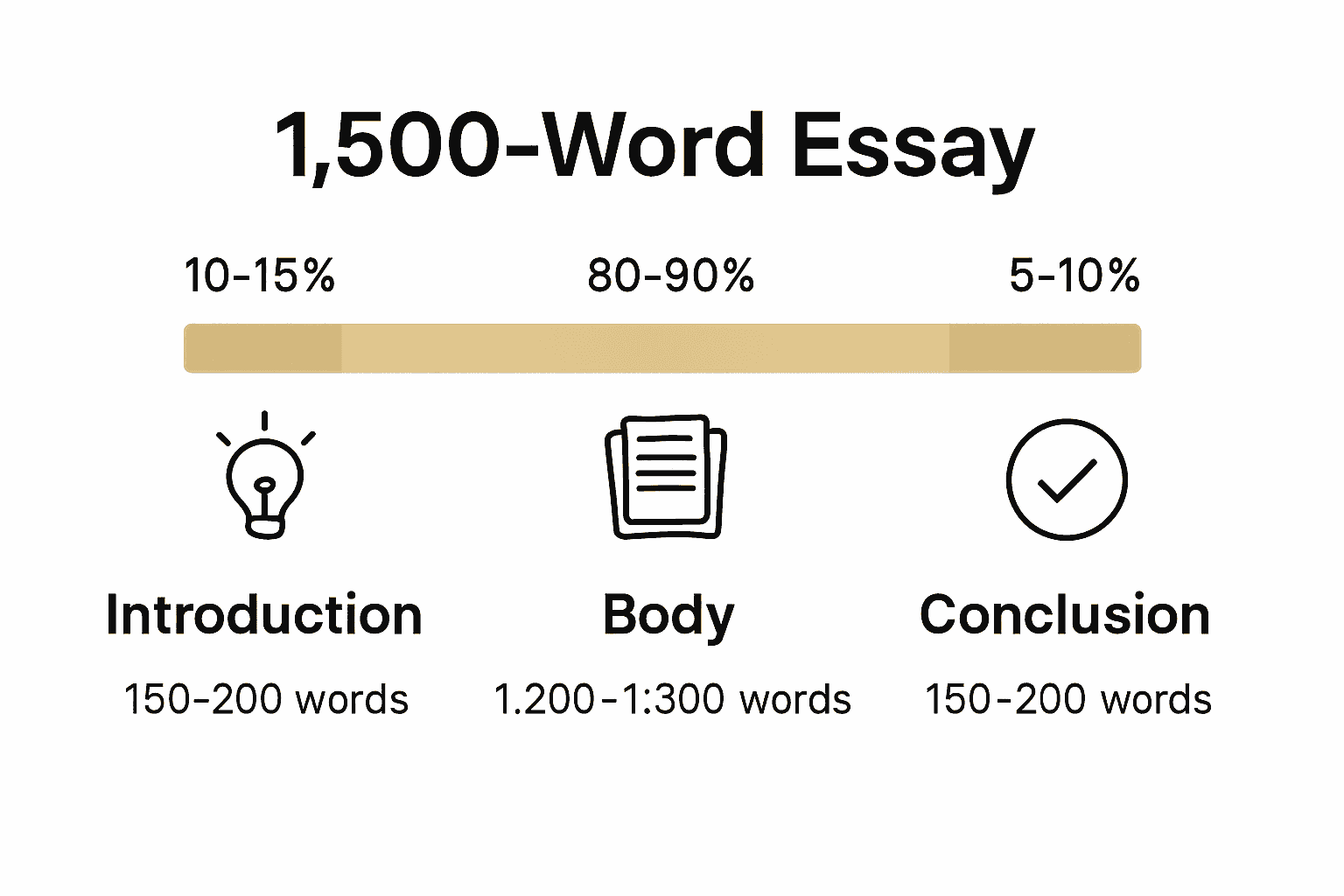Loading...

Did you know that a 1500-word essay can take up to five hours to write well for many students? Tackling this assignment is about much more than meeting a word quota. It tests your ability to craft a convincing argument, showcase critical thinking, and structure ideas clearly. Mastering the demands of this essay format gives you a valuable edge in academic writing and sets you up for deeper, more effective learning.
| Point | Details |
|---|---|
| Essay Purpose | A 1500-word essay assesses a student's ability to articulate complex ideas and present coherent arguments. |
| Structure Breakdown | Essays should have a clear introduction (150-200 words), a body (1000-1200 words), and a conclusion (150-200 words) for effective exploration of topics. |
| Academic Integrity | Maintaining originality is crucial; this involves proper citations, paraphrasing, and engaging critically with sources to avoid plagiarism. |
| Utilizing AI Tools | AI can enhance essay writing by aiding research, improving structure, and ensuring grammatical accuracy, but the final work should reflect personal analysis and integrity. |
A 1500-word essay represents a significant academic writing assignment that challenges students to articulate complex ideas with precision and depth. According to Canterbury Learning Support Center, this format is designed to evaluate a student's ability to present a coherent argument supported by robust evidence within a structured framework.
Essays are fundamental academic compositions that require more than simple information recitation. As Wikipedia explains, an essay is a "prose composition with a focused subject of discussion," typically used in academic settings to assess a student's comprehension and analytical thinking skills. In the case of a 1500-word essay, writers must demonstrate several critical capabilities:
The purpose of a 1500-word essay extends beyond mere word count. It serves as an intellectual exercise that compels students to dive deep into a specific topic, critically examine different perspectives, and construct a nuanced, well-reasoned argument. Unlike shorter writing assignments, this length allows for more comprehensive exploration, requiring students to balance detailed analysis with concise communication.
Successful 1500-word essays typically follow a strategic approach: introducing a clear thesis, providing substantial evidence, analyzing complex ideas, and drawing meaningful conclusions. Students must master the art of being thorough yet economical with their language, making every word count toward building a compelling academic narrative. Learn more about crafting effective academic essays in our comprehensive essay structure tutorial.
Writing a 1500-word essay requires a strategic approach to word allocation and structural organization. According to Canterbury Learning Support Center, a typical 1500-word essay should be carefully proportioned, with the introduction consuming approximately 10% of the total word count, the body divided into multiple substantive paragraphs, and a concise conclusion that synthesizes key arguments.
The recommended word count breakdown for a 1500-word essay looks like this:
Here's a summary of the recommended word count allocation for a 1500-word essay:
| Section | Word Count Range | Key Focus Areas |
|---|---|---|
| Introduction | 150-200 words | Topic overview Thesis statement Essay outline |
| Body | 1000-1200 words | Arguments Evidence & analysis Critical reasoning |
| Conclusion | 150-200 words | Restate thesis Summarize arguments Final insights |

As Australian Academic Support Association emphasizes, maintaining clarity and coherence is crucial. Each section should flow logically, with smooth transitions between paragraphs and a clear progression of ideas. The goal is to create a comprehensive yet concise exploration of your chosen topic.

Effective word management means being intentional about content. Avoid redundancy and ensure every sentence contributes meaningfully to your argument. Learn more about crafting precise academic writing in our word count conversion guide.
Academic writing encompasses a diverse range of essay types, each with unique characteristics and specific purposes. As Wikipedia explains, essays can be broadly classified into several fundamental categories that challenge students to demonstrate different intellectual skills and approaches.
The primary essay types include:
According to Canterbury Learning Support Center, academic essays must adhere to rigorous scholarly standards. These requirements typically involve:
Successful academic writing goes beyond simply presenting information.
It requires students to engage critically with their subject matter, synthesize complex ideas, and communicate them effectively. Learn more about mastering different academic writing styles in our comprehensive guide on academic writing types.
Crafting a successful 1500-word essay requires a systematic approach to planning, research, and drafting. According to Australian Academic Support Association, effective essay writing begins with thorough preparation, including a deep understanding of the topic and comprehensive research strategies.
The research and planning phase involves several critical steps:
Canterbury Learning Support Center emphasizes the importance of logical idea organization. Your drafting strategy should focus on creating a coherent argument where each paragraph builds systematically toward your central thesis. This means:
Successful drafting is an iterative process that requires patience and critical thinking. Start with a rough draft, then refine your argument, tighten your language, and eliminate unnecessary complexity. Explore our comprehensive guide to creating a structured essay outline to streamline your writing process.
Academic integrity is the cornerstone of scholarly writing, requiring meticulous attention to originality and proper source attribution. As Wikipedia emphasizes, maintaining academic integrity demands precise citation practices to acknowledge original authors and prevent plagiarism, which represents a serious academic transgression.
Key strategies for ensuring originality include:
According to Australian Academic Support Association, upholding academic credibility requires more than simply avoiding direct copying. Writers must develop sophisticated techniques for integrating external ideas while maintaining their unique voice and analytical perspective. This involves:
Successful academic writing is about creating an original dialogue with existing scholarship. By carefully attributing sources and transforming borrowed ideas through critical analysis, you demonstrate intellectual sophistication. Explore our comprehensive guide to research paper citations to elevate your academic writing skills.
The landscape of academic writing is rapidly evolving with the integration of artificial intelligence technologies. According to Canterbury Learning Support Center, students can enhance their writing efficiency by intelligently integrating AI tools while maintaining academic integrity and originality.
Key strategies for effectively using AI writing tools include:
Australian Academic Support Association emphasizes the importance of critically evaluating AI suggestions. While these tools offer significant support, students must remember that the final work should ultimately reflect their own understanding and analytical skills. This means:
Successful academic writing combines technological assistance with personal intellectual effort. Discover strategies for maximizing academic success with AI technologies to transform your essay writing approach.
Struggling to balance thorough research, clear structure, and original analysis in your 1500-word essay can be overwhelming. You want to craft a compelling thesis, develop strong arguments, and avoid plagiarism while meeting precise word count requirements. This is where efficient planning and refinement become critical but challenging.

Unlock the power of AI with Samwell.ai, the advanced platform designed to support students throughout the entire essay process. Whether you need help creating a detailed outline, enhancing your academic tone, or ensuring your citations follow MLA or APA standards, Samwell.ai’s tools like the Power Editor and Guided Essays give you targeted assistance. Stop worrying about missing key elements or spending endless hours drafting. Instead, take advantage of technology that keeps your writing original and aligned with academic expectations. Visit Samwell.ai today to experience smarter writing support. Learn how to plan with precision in our structured essay outline guide and improve your writing flow with tips from our academic writing blog. Your best essay starts here.
The purpose of a 1500-word essay is to allow students to explore a topic in depth, develop clear arguments, and demonstrate critical thinking skills through structured writing.
A 1500-word essay should include an introduction (150-200 words), body paragraphs (1000-1200 words), and a conclusion (150-200 words), ensuring that each section flows logically and supports the thesis statement.
Common types of essays suitable for a 1500-word assignment include descriptive, narrative, expository, and argumentative essays, each requiring different writing approaches and techniques.
To avoid plagiarism, ensure you properly cite your sources, paraphrase information accurately, and utilize quotation marks for direct quotes. Additionally, using plagiarism detection tools can help verify originality.



